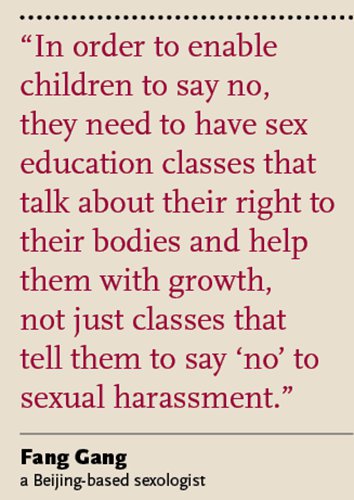IN-DEPTH / IN-DEPTH
Many victims of sexual assault in China don’t know they are molested
Schools should be obliged to report abuse to fight pedophilia
○ It has become common for child sexual abuse cases to be exposed on the Internet, where social media outrage can force the authorities to act, however this process can harm victims
○ Experts say China's child welfare system is flawed, as inter-departmental communication is lacking and there are no clear guidelines for intervention

When writer Chen Lan, who has more than 580,000 followers on Weibo, received a photo from one of her fans which showed a young girl being molested in public, she immediately posted it online, hoping it would make an impact.
It did. Within hours, her post was forwarded more than 140,000 times and the image had gone viral all over the Internet.
The photo was taken at Nanjing South Railway Station in August, and shows a preteen girl sitting on a young man's lap as he tucks his hands into her clothes. A middle-aged couple are nearby, who are suspected to be the girl's parents.
It aroused waves of questions. Who are these people? Why didn't they stop the man? Why does the girl look so calm?
Within hours, Nanjing railway police were asking Chen for more details. On August 28, the Nanjing Railway Procuratorate announced they had arrested the molester, who they identified as the girl's brother. Officials also said the girl is adopted. The case is now being reviewed.
But the quick reaction left questions unanswered. Chen wrote on her Weibo that it was fortunate the image was shared and forwarded many times, "but if the netizen didn't send out the photo, but reported it to the local police, the molester would probably have not been arrested because he's placed under the umbrella protection of 'family.'"

In the digital age
In recent years, there's been a trend of sexual assault and harassment cases being exposed online rather than through conventional law enforcement channels. By posting information and photos online, public anger can force law enforcement to act rapidly.
Just days after the Nanjing railway station case, images of another child molester went viral online. Police later confirmed that the man shown inappropriately touching a young girl in these images was her uncle.
On August 15, Internet police in Jiangsu Province received an anonymous report from a Weibo user who claimed to have found a website hosting videos of young girls being molested. It cost 30 yuan ($4.59) to sign up to the site and see their library of videos. The girls are shown in various states of undress and performing sexually-charged actions such as licking feet or taking off their clothes. The website also sells socks, shoes and even underwear worn by the children.
Sun Xuemei, one of the founders of advocacy group the Girls' Protection Foundation, told the media that the cases revealed online are only the tip of the iceberg.
According to Girls' Protection Foundation research, from 2013 to 2015, there were 968 child sexual assault cases in China exposed online and in the media, with 1,790 victims. This data doesn't include news reports that were ambiguous about the number of victims and simply used the word "multiple."
Furthermore, the consensus of society and academia on this issue is that there are about seven unreported cases for every one that is exposed, Wang Dawei, a professor with People's Public Security University of China, told the Xinhua News Agency.

Some netizens choose to report such cases on the Internet because they either have no other choice or are not aware of any alternatives. Earlier this year, a student surnamed Zhang exposed a cellphone application on question-and-answer site zhihu.com which contained information about child sexual abuse cases.
She also wrote that most of the victims mentioned on the app were minors living in small towns and many didn't even realize they were being assaulted or raped. Some of them were even being raped by their relatives. It was a shocking sight and got her thinking, what could others do to help?
After she posted the information online, she was contacted by the media and by the public account of the Central Committee of the China Communist Youth League, who told her they will look into it.
When the Global Times contacted Zhang, she said she doesn't want to say too much about it, in fact, she said she is confused as to what has actually happened. She doesn't know what is going on in the investigation after the exposure.
In the view of Li Sipan, director of the Women Awakening Network, a women's rights NGO, the fact that these cases are revealed online shows something has gone wrong in real-life child welfare monitoring.
In her experience, many such victims or their close family and friends choose to expose incidents online only after they fail to receive help in real life, whether it's an inadequate police response or a lack of refuges and other aid.
Li Ying, director of the Beijing Yuanzhong Gender Development Center, told the Global Times that unpredictable things can happen during online rescues and that's why organizations don't recommend revealing abuse online.
"First, there's no way to tell whether the reports are real; second, it's difficult to establish trusting relationships with victims over the Internet; third, especially for children, online rescues might harm their privacy or cause other protection issues," she said. "That's why we recommend going through real-life channels, such as police, women's federations, etc."
Li Sipan has witnessed poorly-handled online rescues.
At the beginning of this year, a 17-year-old woman in Jiangxi Province called out for help online, saying she had been sexually abused by her father for four years. Her family forbade her from calling the police and she said she couldn't receive help from the local government. In desperation, she turned to the Internet.
Her experience was picked up by a netizen, who brought this to the attention of NGOs, including Li Sipan's, as well as the police and local women's federation. However, the netizen interfered too much, taking everything into their own hands, screening what the victim should reveal and telling the victim that Li Sipan belonged to a media organization.
The victim then grew wary and stopped contacting Li Sipan, just as the local women's group stepped in to offer help. In the end, the suspect was arrested by the police, but it created unnecessary drama and turmoil online. Furthermore, organizations like Li Sipan's lost contact with the victim and couldn't follow up on her condition afterwards.

A flawed system
In theory, reporting abuse offline is the best solution, but there are many deficiencies in the system, said Li Ying.
The Women Awakening Network's public account answered the Zhihu question "how to help girls when it is exposed online they have been sexual assaulted or sexually harassed?"
Their post quoted Li Xin, a worker at the charity and disaster relief office of the Guangzhou Bureau of Civil Affairs, as saying that government bureaus often don't communicate and cooperate with one another on child sexual abuse cases.
She said that once, when a minor reported being assaulted, the local police department couldn't find the kid's guardians and kept the victim in an office in a police station. However, this didn't help relieve the child's stress. In fact, the bureau of civil affairs has temporary sanctuaries designed for such situations, but the police had no idea.
The post concluded that there are major flaws in how child abuse is handled. No government department is taking the lead on this issue, and there are no clear guidelines on how inventions should be carried out on the grass-roots level. There's also a lack of child welfare monitoring and sex education courses.
"This is why many choose to expose these issues online and hope to pressure relevant departments into action and solving questions," Li Ying said. "I think that's a sad phenomenon."
Fang Gang, a Beijing-based sexologist, told the Global Times that every time something like this happens, people start talking about sexual harassment prevention education as if it can be a magic bullet.
"In order to enable children to say no, they need to have sex education classes that talk about their right to their bodies and help them with growth, not just classes that tell them to say 'no' to sexual harassment," he said.
Li Ying thinks in order to protect minors, the police, government, and legal departments must play an essential role, and organizations like Yuanzhong also need to play a role, such as helping to report cases, collect evidence and provide victims with legal, psychological support and companionship.
"But there's more that needs to be done. For example, the monitoring of underage kids, which often involves schools. There should be a complete system where it's mandatory for teachers to report such incidents," she said. "After reporting, there needs to be better case-handling from police and other government departments, such as reducing harm for the children. There needs to be training to instill that kind of mindset."
○ Experts say China's child welfare system is flawed, as inter-departmental communication is lacking and there are no clear guidelines for intervention

A growing number of people are exposing child molestation cases online to get attention from the authorities. Photo: IC
When writer Chen Lan, who has more than 580,000 followers on Weibo, received a photo from one of her fans which showed a young girl being molested in public, she immediately posted it online, hoping it would make an impact.
It did. Within hours, her post was forwarded more than 140,000 times and the image had gone viral all over the Internet.
The photo was taken at Nanjing South Railway Station in August, and shows a preteen girl sitting on a young man's lap as he tucks his hands into her clothes. A middle-aged couple are nearby, who are suspected to be the girl's parents.
It aroused waves of questions. Who are these people? Why didn't they stop the man? Why does the girl look so calm?
Within hours, Nanjing railway police were asking Chen for more details. On August 28, the Nanjing Railway Procuratorate announced they had arrested the molester, who they identified as the girl's brother. Officials also said the girl is adopted. The case is now being reviewed.
But the quick reaction left questions unanswered. Chen wrote on her Weibo that it was fortunate the image was shared and forwarded many times, "but if the netizen didn't send out the photo, but reported it to the local police, the molester would probably have not been arrested because he's placed under the umbrella protection of 'family.'"

The suspect tucks his hands into a young girl's clothes. Photo: Screenshot of Sina Weibo
In the digital age
In recent years, there's been a trend of sexual assault and harassment cases being exposed online rather than through conventional law enforcement channels. By posting information and photos online, public anger can force law enforcement to act rapidly.
Just days after the Nanjing railway station case, images of another child molester went viral online. Police later confirmed that the man shown inappropriately touching a young girl in these images was her uncle.
On August 15, Internet police in Jiangsu Province received an anonymous report from a Weibo user who claimed to have found a website hosting videos of young girls being molested. It cost 30 yuan ($4.59) to sign up to the site and see their library of videos. The girls are shown in various states of undress and performing sexually-charged actions such as licking feet or taking off their clothes. The website also sells socks, shoes and even underwear worn by the children.
Sun Xuemei, one of the founders of advocacy group the Girls' Protection Foundation, told the media that the cases revealed online are only the tip of the iceberg.
According to Girls' Protection Foundation research, from 2013 to 2015, there were 968 child sexual assault cases in China exposed online and in the media, with 1,790 victims. This data doesn't include news reports that were ambiguous about the number of victims and simply used the word "multiple."
Furthermore, the consensus of society and academia on this issue is that there are about seven unreported cases for every one that is exposed, Wang Dawei, a professor with People's Public Security University of China, told the Xinhua News Agency.

The man in the circle is the suspect in the Nanjing railway station child sexual assault. Photo: Screenshot of Sina Weibo
From online to offlineSome netizens choose to report such cases on the Internet because they either have no other choice or are not aware of any alternatives. Earlier this year, a student surnamed Zhang exposed a cellphone application on question-and-answer site zhihu.com which contained information about child sexual abuse cases.
She also wrote that most of the victims mentioned on the app were minors living in small towns and many didn't even realize they were being assaulted or raped. Some of them were even being raped by their relatives. It was a shocking sight and got her thinking, what could others do to help?
After she posted the information online, she was contacted by the media and by the public account of the Central Committee of the China Communist Youth League, who told her they will look into it.
When the Global Times contacted Zhang, she said she doesn't want to say too much about it, in fact, she said she is confused as to what has actually happened. She doesn't know what is going on in the investigation after the exposure.
In the view of Li Sipan, director of the Women Awakening Network, a women's rights NGO, the fact that these cases are revealed online shows something has gone wrong in real-life child welfare monitoring.
In her experience, many such victims or their close family and friends choose to expose incidents online only after they fail to receive help in real life, whether it's an inadequate police response or a lack of refuges and other aid.
Li Ying, director of the Beijing Yuanzhong Gender Development Center, told the Global Times that unpredictable things can happen during online rescues and that's why organizations don't recommend revealing abuse online.
"First, there's no way to tell whether the reports are real; second, it's difficult to establish trusting relationships with victims over the Internet; third, especially for children, online rescues might harm their privacy or cause other protection issues," she said. "That's why we recommend going through real-life channels, such as police, women's federations, etc."
Li Sipan has witnessed poorly-handled online rescues.
At the beginning of this year, a 17-year-old woman in Jiangxi Province called out for help online, saying she had been sexually abused by her father for four years. Her family forbade her from calling the police and she said she couldn't receive help from the local government. In desperation, she turned to the Internet.
Her experience was picked up by a netizen, who brought this to the attention of NGOs, including Li Sipan's, as well as the police and local women's federation. However, the netizen interfered too much, taking everything into their own hands, screening what the victim should reveal and telling the victim that Li Sipan belonged to a media organization.
The victim then grew wary and stopped contacting Li Sipan, just as the local women's group stepped in to offer help. In the end, the suspect was arrested by the police, but it created unnecessary drama and turmoil online. Furthermore, organizations like Li Sipan's lost contact with the victim and couldn't follow up on her condition afterwards.

A flawed system
In theory, reporting abuse offline is the best solution, but there are many deficiencies in the system, said Li Ying.
The Women Awakening Network's public account answered the Zhihu question "how to help girls when it is exposed online they have been sexual assaulted or sexually harassed?"
Their post quoted Li Xin, a worker at the charity and disaster relief office of the Guangzhou Bureau of Civil Affairs, as saying that government bureaus often don't communicate and cooperate with one another on child sexual abuse cases.
She said that once, when a minor reported being assaulted, the local police department couldn't find the kid's guardians and kept the victim in an office in a police station. However, this didn't help relieve the child's stress. In fact, the bureau of civil affairs has temporary sanctuaries designed for such situations, but the police had no idea.
The post concluded that there are major flaws in how child abuse is handled. No government department is taking the lead on this issue, and there are no clear guidelines on how inventions should be carried out on the grass-roots level. There's also a lack of child welfare monitoring and sex education courses.
"This is why many choose to expose these issues online and hope to pressure relevant departments into action and solving questions," Li Ying said. "I think that's a sad phenomenon."
Fang Gang, a Beijing-based sexologist, told the Global Times that every time something like this happens, people start talking about sexual harassment prevention education as if it can be a magic bullet.
"In order to enable children to say no, they need to have sex education classes that talk about their right to their bodies and help them with growth, not just classes that tell them to say 'no' to sexual harassment," he said.
Li Ying thinks in order to protect minors, the police, government, and legal departments must play an essential role, and organizations like Yuanzhong also need to play a role, such as helping to report cases, collect evidence and provide victims with legal, psychological support and companionship.
"But there's more that needs to be done. For example, the monitoring of underage kids, which often involves schools. There should be a complete system where it's mandatory for teachers to report such incidents," she said. "After reporting, there needs to be better case-handling from police and other government departments, such as reducing harm for the children. There needs to be training to instill that kind of mindset."
